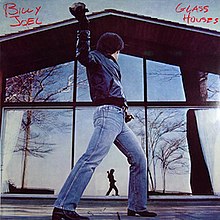Glass Houses
| Glass Houses | ||||||||||
|---|---|---|---|---|---|---|---|---|---|---|
 |
||||||||||
| Studio album by Billy Joel | ||||||||||
| Released | March 10, 1980 | |||||||||
| Recorded | 1979 | |||||||||
| Genre | ||||||||||
| Length | 35:06 | |||||||||
| Label | Family Productions/Columbia | |||||||||
| Producer | Phil Ramone | |||||||||
| Billy Joel chronology | ||||||||||
|
||||||||||
| Singles from Glass Houses | ||||||||||
|
||||||||||
| Professional ratings | |
|---|---|
| Review scores | |
| Source | Rating |
| Allmusic | |
| Rolling Stone | |
| Smash Hits | 8/10 |
Glass Houses is the seventh studio album by American singer-songwriter Billy Joel, released on March 10, 1980. It features Joel's first song to peak at #1 on Billboard's Pop Singles chart, "It's Still Rock and Roll to Me." The album itself topped the Pop Albums chart for six weeks and was ranked number 4 on Billboard's 1980 year-end album chart. The album is the 41st best selling album of the 1980s, with sales of 7.1 million copies in the US alone. In 1981, Joel won a Grammy Award for "Best Male Rock Vocal Performance" for his work on Glass Houses. According to music critic Stephen Thomas Erlewine, the album featured "a harder-edged sound" compared to Joel's other work, in response to the punk and new wave movements.
This album was the third collaboration between Joel and producer Phil Ramone, following The Stranger and 52nd Street.
Opening with the sound of glass shattering, Glass Houses has more of a hard rock feel than Joel's previous albums. The cover shows Joel poised to throw a rock through the two-story window of his real-life waterfront glass house in Cove Neck. On some versions, the back cover shows Billy looking through the hole that the rock made in the glass. This alludes to the adage that "people in glass houses shouldn't throw stones."
In 2004, the pop-culture journalist and rock critic Chuck Klosterman praised the album in an essay on Joel titled "Every Dog Must Have His Every Day, Every Drunk Must Have His Drink" from his book Sex, Drugs, and Cocoa Puffs (the title of the essay refers to a line from the Glass Houses song "Don't Ask Me Why") In particular, Klosterman praised some of the more obscure tracks from the album including "All for Leyna", "I Don't Want to Be Alone", "Sleeping with the Television On", and "Close to The Borderline."
...
Wikipedia

